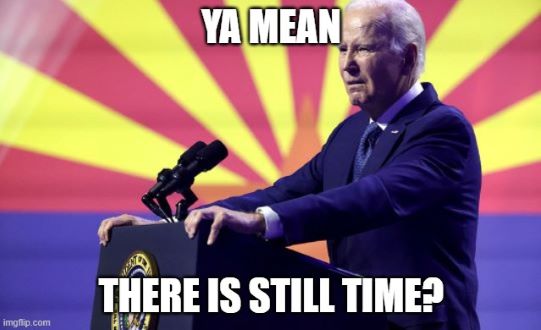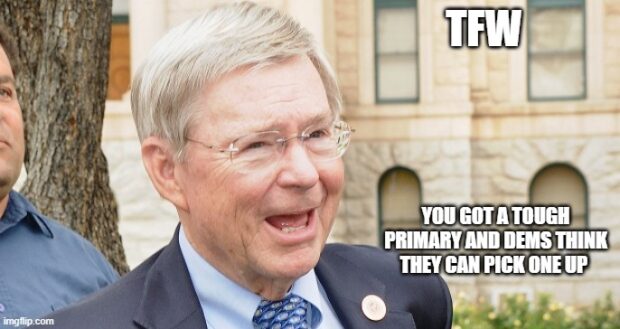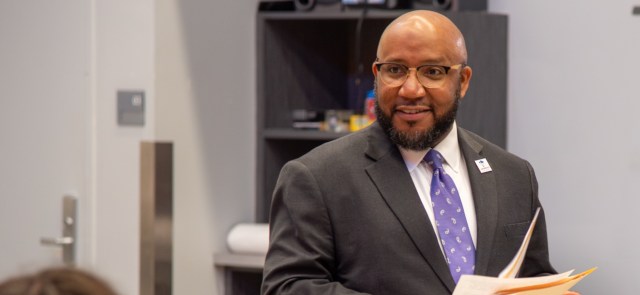Stay ahead of the curve as a political insider with deep policy analysis, daily briefings and policy-shaping tools.
Request a DemoAG asks court to dismiss suit that cites non-existent school
Lake appeals to the state Supreme Court in last-ditch effort
Republicans push to make ballot envelopes part of election records
Dem money flowing to LD17
Photo by Capitol Media Services Democrats are pouring money into LD17 to try and unseat Wadsack, Jones or McGarr. According to Thursday's Arizona Democratic Legislative Campaign Committee news release, both Democratic Senate candidate John McLean and House candidate Kevin Volk raised over $100,000. Last election, Democratic candidates raised $37,000 and lost in close House races that surprised many. McGarr and Wadsack haven’t filed campaign finance reports yet for quarter 2, but Jones raised $20,000 in the period. The three Republicans all raised similar numbers in quarter one. McGarr raised $14,000, Wadsack raised $10,000 and Jones raised $8,000. A June 25 news release from the Republican State Leadership Committee, which is equivalent to the ADLCC, acknowledged Republicans won’t be able to match the “constellation of national Democrat organizations that spend on state legislative races dollar for dollar,” but the organization is spending $38 million on legislative races in states that could see legislative control flip in the election, like Arizona. Sundareshan, who moonlights as the ADLCC chair, participated in a press conference with the national Democratic Legislative Campaign Committee on Wednesday and said the uncertainty of the Biden campaign and recent calls from Congressional Democrats for the President not to run are not affecting ADLCC’s strategy at the state level. “Despite how people might feel about the federal government or federal candidates, state legislative candidates are the people on the doors, they're inspiring voters by telling their real stories and their real motivations about why they’re running for office,” Sundareshan said. “I continue to be very excited about what our state legislative candidates can do.”
HCR2060 battle lines getting drawn
An awareness effort in opposition of Prop. 314 – formerly HCR2060 (Border; benefits; fentanyl; illegal entry) – has already entered full swing while its constitutionality is being weighed in Maricopa County Superior Court. Members of the National Hispanic Caucus of State Legislators and business leaders spoke against the measure on Thursday and compared it to similar legislation across the country, while emphasizing the need for more federal immigration action. “This year, we have seen an important increase in toxic rhetoric around immigration, especially around undocumented immigrants, around asylum seekers,” Utah Rep. Angela Romero, president of the National Hispanic Caucus of State Legislators, said. Immigration reform should be centered around processing asylum seekers, and there has been a “lack of work to fix our immigration system for political gain,” Romero said. “We’re seeing this unfold on a state level,” Romero said. The panel pointed out the similarity between Prop. 314, Texas’ SB4 and Oklahoma’s HB4156. “As a longtime leader in the Arizona business community, I want to really commend President Biden for the actions that he took recently to grant work permits to spouses of US citizens and ‘Dreamers,’” John Graham, a board member of the American Business Immigration Coalition, said. “Common-sense, compassionate action is economically crucial and morally right. It stands in stark contrast to the promises we’ve been hearing about mass exportations and mass deportations in state-level bills here in Arizona as well as around the country.” While Graham said he appreciated Biden’s recent executive order, he said he “hopes to see more” from him and both parties in Congress. What separates Arizona’s GOP-backed immigration policy from that of other states is that it is being turned to voters, Bravo noted. “HCR2060, now Prop 314, continues the false narrative that there is an invasion at Arizona’s southern border by mixing language from (Texas’) SB4 with language about E-verify and the transfer and sale of non-American fentanyl,” Bravo said. The legal challenge of Prop. 314 and whether it violates the single-subject rule kicked off in a hearing on Monday, and attorneys for Republican legislators said it did not violate the rule. Notably, Arizona’s Pop. 314 would not go into effect, if approved by voters, until enforcement of Texas’ SB4 is settled by the courts.
Rogers sticking by her ‘maintenance guy’ or ‘crew chief’ or whatever Slaton did in ‘Nam
Lewis reflects on work of Kansas African American Affairs Commission, says progress was elusive
The Kansas African American Affairs Commission is losing a key cog with the imminent departure of long-serving member Anthony Lewis.
Lewis was hired in 2018 as the Lawrence school district’s first Black superintendent but will soon leave for the same role at Durham Public Schools in North Carolina.
The Legislature created the commission through a 1997 bill to undertake advocacy work around public policy issues directly affecting the African American community. Three of the commission’s seven members are appointed by the Governor’s Office and the remainder by legislative leadership. Lewis also served on the now-defunct Governor’s Commission on Racial Equality and Justice, whose formation came on the heels of the high-profile murder of George Floyd in 2020.
Gov. Laura Kelly lauded Lewis for his contributions to racial equity. A gifted speaker, Lewis delivered a keynote address at last month’s inaugural Juneteenth ceremony at the Kansas Statehouse.
“Throughout his time on the Kansas African American Affairs Commission and the Commission on Racial Equity and Justice, Dr. Lewis has been an exemplary leader and provided the commissions with great insight thanks to his extensive experience in education,” Kelly said in a statement sent to State Affairs. “I wish him luck in his future endeavors.”
Lewis: Progress was ‘minimal’
Lewis praised Kelly for “swiftly” assembling the Commission on Racial Equality and Justice during a period of major racial unrest. But as far as addressing racial disparities in the Sunflower State, Lewis said he found progress to be elusive during his time on the commissions.
“It was minimal,” he said. “But we were trying to put some structures in place for our long-term advocacy work while also continuing to collaborate with our Black legislative caucus.”
He cited a reluctance on the part of conservative supermajorities in the House and Senate to act on issues pressing to the African American community. Lewis also drew attention to “organized efforts and playbooks” he said are being deployed throughout the country “to try and dismantle our work and take us back hundreds of years.”
“It makes the work much more difficult and frustrating,” he said. “It seems like when we’re taking two steps forward, we get knocked five steps back.”
All levels of government, Lewis said, need to provide “courageous leadership” to break down racial barriers and “create a more equitable and just society.”
Rep. Stephen Owens, R-Hesston, said he disagrees with any characterization that the Legislature isn’t doing enough to address racial disparities. He pointed to the Legislature’s unanimous passage of a bill reforming Kansas’ civil asset forfeiture laws. The laws governing civil asset forfeiture had long been viewed by some as disproportionately impacting low-income and minority residents of the state.
Owens said he spearheaded the reform efforts that now “disproportionately impact African Americans in a positive way.”
“There is a lot of great work that we do that may not be specific to what one person wants, but is beneficial to Kansans,” he said. “I always keep an open mind and an open heart to any issues that are brought forward to me. It’s also incredibly important that the commission continues to meet and work with the Legislature.”
Lewis said the Commission on Racial Equality and Justice conducted research and submitted reports on issues such as policing practices and racial profiling. The reports produced recommendations for the Legislature, as well as other state and local agencies. The commissions also studied topics such as K-12 education policies impacting minority students, Black maternal health rates and economic development.
A bill banning state colleges from using diversity, equity and inclusion practices for hiring and admissions proved divisive for those advocating on behalf of the African American community. Lewis called the legislation, which went into law without Kelly’s signature, a setback.
Owens, however, disagreed.
“The best candidate is who we should hire — regardless of race, religion, color creed or sexual orientation,” he said. “Our universities should be hiring the best candidate because they are the best candidate.”
Policy-wise, Lewis oversaw one of the most progressive school districts in the state. For example, Lawrence Public Schools has a carefully crafted equity and inclusion plan.
“That policy holds me as a superintendent and our staff accountable for moving the needle as it relates to academics for all racial subgroups,” Lewis said. “So I think Lawrence is farther along than other areas of the region, but there’s still work to be done.”
Lewis said that soon after arriving in Lawrence, he took part in a two-day training seminar focused on a Glenn E. Singleton publication that offers a roadmap for achieving racial equity in schools.
“That’s unheard of in many school systems,” Lewis said.
“There are K-12 school systems across the state that are not allowed to use words like ‘diversity,’ ‘equity,’ and ‘inclusion’ — at all. So that’s disheartening,” Lewis said. “And you have elected school board members and people running for school boards with the purpose of dismantling some of this work.”
As he readies for his departure to North Carolina, Lewis said the Kansas African American Affairs Commission needs to remain undeterred by recent legislative setbacks.
“This work not only affects us today but should also impact future generations,” he said. “Because I always say, ‘Our kids are watching and listening,’ so what type of model are we serving for them?”
Stacey Knoell, executive director of the Kansas African American Affairs Commission, said attempting to make racial justice issues a focal point in the Legislature has been “challenging” the past few years. She said many recommendations arose from Lewis’ work on the commissions. The lack of legislative support, Knoell said, “is not reflective of his efforts,” but rather a reflection of House and Senate inaction.
“He’s been invaluable,” Knoell said, “and has remained actively involved in trying to move the needle on racial justice issues.”
Sen. David Haley, a member of the Legislature’s African American caucus and longest-serving senator, commended Lewis for his “commitment to equality for all students irrespective of economic background.”
“Lawrence’s loss is Durham’s gain,” he said.
Haley, D-Kansas City, said the Kansas African American Affairs Commission’s best efforts have been “tamped down, if not entirely muted” and the rise of “buzzwords or buzz initials” related to topics such as diversity, equity and inclusion as well as critical race theory perpetuate racism.
“These buzzwords become dog whistles,” he said.
Said Owens, “There are 125 in the House and 40 in the Senate that ultimately take recommendations from subcommittees, bodies and various other organizations — many of which are not adopted. Just because one subcommittee makes a recommendation and it doesn’t get passed doesn’t mean the Legislature is muting their voice.”
Matt Resnick is a statehouse reporter at State Affairs Pro Kansas/Hawver’s Capitol Report. Reach him at [email protected].
Senate Appropriations Committee Approves Subcommittee Chair Sinema’s Military Construction & VA Improvement Bipartisan Legislation
Weekend Freeway Travel Advisory (July 12-15) – Phoenix Area
- Southbound I-17 closed at Jomax Road from 9 p.m. Friday to 5 a.m. Monday (July 15) for pavement improvement project, with traffic detouring on Jomax Road off- and on-ramps. Southbound I-17 also narrowed to one lane between Loop 303/Sonoran Desert Drive and Jomax Road. East- and westbound Jomax Road will be closed at I-17. Allow extra travel time and be prepared for merging traffic. Note: Please avoid detouring on streets east of I-17 that are designed for local traffic.
- Northbound Loop 101 (Price Freeway) closed between Loop 202 (Santan Freeway) in Chandler and US 60 (Superstition Freeway) in Tempe from 9 p.m. Friday to 5 a.m. Monday (July 15) for a pavement improvement project. Detours: Consider using westbound I-10 and eastbound US 60 as an alternate freeway route to reach northbound Loop 101.



